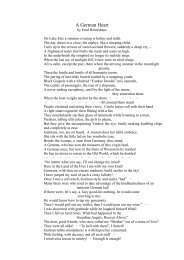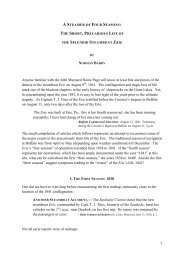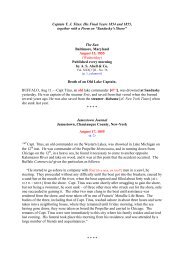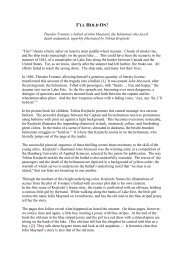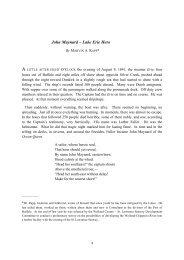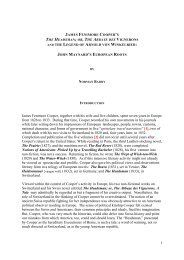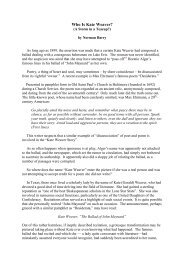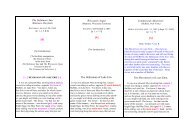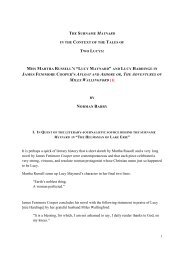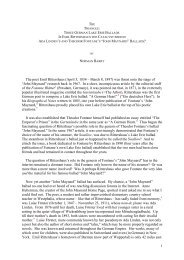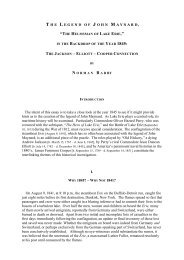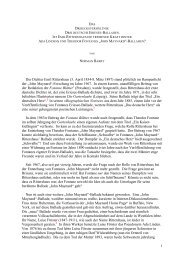The Lessons of the Lexington. - John Maynard Home Page
The Lessons of the Lexington. - John Maynard Home Page
The Lessons of the Lexington. - John Maynard Home Page
Create successful ePaper yourself
Turn your PDF publications into a flip-book with our unique Google optimized e-Paper software.
ON THE EVENING <strong>of</strong> January 13, 1840, <strong>the</strong> steamboat <strong>Lexington</strong>, bound from New York<br />
for Stonington, Connecticut, with a crew <strong>of</strong> forty and nearly one hundred passengers, caught<br />
fire on Long Island Sound. <strong>The</strong> wooden vessel burned like tinder, <strong>the</strong> lifeboats, badly<br />
handled, capsized on being launched, and <strong>the</strong> pilot’s effort to run <strong>the</strong> ship ashore failed when<br />
<strong>the</strong> engines stopped two miles from <strong>the</strong> coast. Occupants <strong>of</strong> <strong>the</strong> vessel had to choose<br />
between burning to death and drowning in frigid water. Only a handful survived.<br />
Three days later, when New York was still humming with conflicting tales <strong>of</strong> <strong>the</strong> disaster,<br />
<strong>the</strong>re appeared what was perhaps <strong>the</strong> first illustrated extra in history. Headed “<strong>The</strong> Extra<br />
Sun,” it bears a finely drawn and violently realistic picture <strong>of</strong> <strong>the</strong> flaming vessel. Figures can<br />
be seen lining <strong>the</strong> rails fore and aft and leaping into <strong>the</strong> water while a starboard lifeboat spills<br />
its occupants into <strong>the</strong> sea after a clumsy launching. In <strong>the</strong> foreground frenzied women and<br />
men in stovepipe hats take a precarious refuge on <strong>the</strong> cotton bales that were <strong>the</strong> ship’s chief<br />
cargo and cling desperately to bits <strong>of</strong> debris. . . . .<br />
“<strong>The</strong> Extra Sun” was a sensation. It received columns <strong>of</strong> newspaper notices. Newsboys<br />
hawked it in <strong>the</strong> streets. <strong>The</strong> presses ran night and day to supply <strong>the</strong> demand. Copies were<br />
shipped to o<strong>the</strong>r cities, and overnight N. Currier became a national institution.<br />
- Harry T. Peters, Currier & Ives, Printmakers to <strong>the</strong> American People (Garden City, New York:<br />
Doubleday, Doran & Co., Inc., 1942), p. 1<br />
By a Juror. When we left <strong>the</strong> boat I did not see much, being obliged to keep <strong>the</strong> end<br />
<strong>of</strong> <strong>the</strong> cotton to <strong>the</strong> sea. When we came round <strong>the</strong> stern, <strong>the</strong> ladies cabin was all on<br />
fire. I saw a lady and ano<strong>the</strong>r person on board. What made me take such notice <strong>of</strong> <strong>the</strong><br />
lady was, that <strong>the</strong>re was a child floating on <strong>the</strong> water astern, and as we passed round<br />
<strong>the</strong> stern, we passed close to this child as it lay floating on its back. <strong>The</strong> lady seeing us<br />
pass her child, cried out to us to save it. I think this was a female child.—It had on a<br />
bonnet and a cloak. We did not attempt to take it from <strong>the</strong> water, for it was perfectly<br />
dead.<br />
By a Juror. I thought <strong>the</strong> child a female from its apparel. We passed so close that I<br />
could have put my hand upon it, but <strong>the</strong> sea was rough, and I had as much as I could<br />
attend to, to keep my bale from upsetting. <strong>The</strong> sea washed over us. We were about up<br />
to <strong>the</strong> waist.<br />
By Mr. Wheeler. <strong>The</strong> boat went down at 8 A.M. not 10 minutes ei<strong>the</strong>r way. We<br />
were about a mile from her when she went down. It was thick wea<strong>the</strong>r when we first<br />
left <strong>the</strong> boat, but cleared up about 9 o’clock. We had a fine night. <strong>The</strong> moon shone,<br />
and went down at about half past 2 o’clock. I looked at my watch almost every half<br />
hour. It was a cold night and required exercise to keep warm.—Without exercise a<br />
person would have chilled through. About 4 A.M. <strong>the</strong> bale capsized with us. A heavy<br />
sea took <strong>the</strong> end and turned us right over.—We contrived to get on <strong>the</strong> bale again, <strong>the</strong><br />
5



